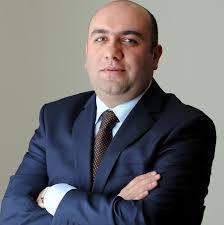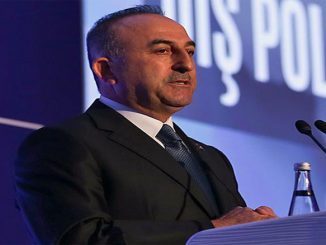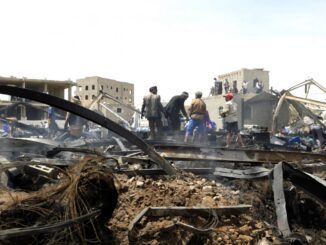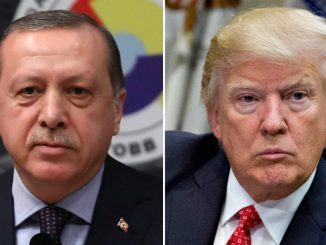
By: ÇETİNER ÇETİN*
It was not a coincidence that Turkey initiated a ground operation on a strategically important region in northern Syria several hours before U.S. Vice President Joe Biden’s Ankara visit. In fact, this attack, which formally targeted DAESH as an enemy, gives a very clear message to the U.S., Europe and Kurds. “We will not compromise on our national interests. We will not condone the formation of a Kurdish state on the other side of the border.”
U.S. Vice President Joe Biden’s Turkey visit started with a slight protocol message. The Turkish Armed Forces (TSK) initiated a military operation on the DAESH-occupied northern Syrian town of Jarablus six hours before Biden arrived in Ankara. When Biden’s plane landed at Esenboğa Airport, he was welcomed merely by a deputy governor instead of a minister.
Turkey is greatly irritated by two factors. First, the U.S. is yet to repatriate the Pennsylvania-based heretical preacher, Fetullah Gülen, who the Turkish government considers to be responsible for the July 15 coup attempt. Second, the Syrian Democratic Forces (SDF), which consists of Arab fighters and the Syrian Kurdish militia of the People’s Protection Units (YPG), removed DAESH from Manbij in mid-August, however, it did not exit the town despite the U.S.’s commitment. This situation was an important step for Syrian Kurds to unite the territories they control in Syria and create a corridor spanning to the Mediterranean. So, they aimed to create a contiguous line of more than 600 kilometers along the Turkish border. Although the Turkish government constantly warned the YPG against passing to the west of Euphrates, the YPG ignored these warnings and seized Manbij with the help of U.S. The Turkish government and public considered this move to be the final straw.
However, unlike the diplomatic irony at the airport, the military operation on Jarablus was not an insult, but an act which was likely to have been carried out in line with an agreement with the U.S. and Russia. Biden’s remarks during the joint press conference with Turkish President Recep Tayyip Erdoğan were aimed at alleviating the anger of Turkish people. He apologized for failing to visit Turkey immediately after the coup attempt. However, it cannot be said that his explanations satisfied the government.
Biden rejected the rumors that coup plotters were supported by the U.S. He assured that the U.S. does not protect Gülen, by appreciating Erdoğan and Turkish people’s courage to resist the coup makers. Frankly speaking, this diplomatic remark was not found so realistic. On the other hand, although Biden requested the YPG to withdraw into the east of Euphrates, this request was indeed considered to be a message indicating that the U.S. might found a boutique state in the east of Euphrates. However, Ankara completely rejects the Democratic Union Party (PYD).
Turkey could not wait any longer. It completely withdrew from the Syria crisis following the fighter jet crisis with Russia in November 2015. However, it returned to the Syrian battlefield through the Jarablus operation. It is a significant development that Turkey intervened in Syria in agreement with other players despite all adverse interests, instead of embarking on an adventure on its own. This is the first major success story that Turkey has achieved since the beginning of the Syrian civil war. One year after DAESH seized the border towns Jarablus and Tal Abyad in summer 2013, Turkey’s then Foreign Minister Ahmet Davutoğlu described DAESH as a “human community which came together out of anger” and its militants as “nihilist young guys.” Here, another significant point is that current Prime Minister Binali Yıldırım’s clear stance on the necessity of removing DAESH from the Turkey border and “draining the swamp” had a great part in the initiation of the operation.
During Davutoğlu’s term as prime minister, he designed a “new Ottoman” foreign policy. To this end, he set two objectives on Syria. First, Bashar al-Assad must be toppled and replaced by a conservative Sunni regime. Second, the expansion of YPG, which is the military affiliate of the Syrian PYD and its Turkey branch, the outlawed Kurdistan Workers’ Party (PKK), must be prevented. However, this led to a tremendous balance shift in the region. Assad remained in power and the PYD consolidated its strength in its “cantons” with the support of the U.S. and Russia. Turkey could not find an ally even for its demand for the creation of a “safe zone” for refugees. When we carefully look to the parameters of the current period, we see a Turkey which is striving to “reduce the number of its enemies and increase the number of its friends.” Moreover, Turkey is not isolated in the military dynamism in the region as it is engaged in the Jarablus operation.
Turkey started facing DAESH’s attacks after it joined the anti-DAESH coalition and opened the Incirlik Air Base to the use of coalition forces last summer. DAESH initial attacks were aimed at leftists and Kurdish opponents and they continued with foreign tourists. The most recent DAESH attacks were experienced at the Atatürk Airport in June and during a Kurdish wedding celebration in Gaziantep two weeks ago. It is being gradually understood that DAESH is at least as dangerous as the PKK for Turkey’s nationalists and Islamist intellectuals.
As such, the operation named “Euphrates Shield” is a temporary consequence of Turkey’s revised Syria policy. Although Erdoğan said during the joint press conference with Biden that democracy cannot be established in a Syria administrated by Assad, Assad’s removal is no longer a first priority for Turkey. Some part of the agreement that was reached with Russia is probably as follows: Turkey will condone Assad in the transition period. And Russian President Vladimir Putin paved the way for a reconciliatory ground by saying that Assad is not Russia’s kin during his meeting with Erdoğan. In return for this, Russia will put distance between Kurds and itself. The conflict which has emerged between the YPG and the regime’s troops in the Syrian town of Haseki for the first time in years is an indicator of this turning point.
From now on, Turkey can completely focus on fighting DAESH and curbing the PKK and PYD. Turkey took the precedence of the PKK and PYD through the Free Syrian Army (FSA) and Turkmen militia’s seizure of Jarablus. It is not so significant that there are radical Islamists in this alliance at the moment, as Assad declared any groups in Syria, apart from DAESH and Kurds, to be “rebels” – which the West already took for granted.
The plans of Kurds, who were “everyone’s favorite” in the U.S. and EU until a few months ago, went wrong. They gained prestige on the international arena in a short time as they defended Kobani against DAESH in 2014 and rescued Yazidi refugees from the Sinjar Mountains in northern Iraq. PKK terrorist organization leader Cemil Bayık’s self-assured remark that “the U.S. needs Kurds” in summer 2015 was ignored. Moreover, Kurds underestimated the prediction that their attacks on Turkish security forces and civilians, in addition to the PKK’s initiation of an urban war following the ceasefire, would harm this prestige. And they added many other things to their list of failures.
On the other hand, it seems that the PYD acts with the same reflexes and self-confidence on the Jarablus issue as it did not draw the reaction of the U.S. and Russia after it seized Tal Abyad last year. Although Arabs lived in this region before the war broke out, the PYD stakes a claim on both cities, claiming that they are the parts of Rojava (Eastern Kurdistan). However, the reputation of Kurds as “the only effective fighting force” against DAESH, which it gained since it started moving toward DAESH targets with the U.S. and Turkish army’s support, is disappearing. Perhaps, the U.S. will not give up supporting the PYD, however, Biden’s order to withdraw into the east of Euphrates, as well as the U.S.’s plans with respect to the PYD, is not about a geographical border alone.
Turkey is making a move to establish a southern Lebanon-style buffer zone on the 106-kilometer long Azaz-Jarablus line in Syria. This model means that a buffer zone can be created without the U.N.’s approval.
Previously, Israel declared a unilateral buffer zone in southern Lebanon, where Hezbollah camps were located, for its own security. Likewise, Turkey is expected to make a move to found a unilateral buffer zone. Ankara predicts that it will carry at least 1 million Syrian refugees to the Azaz-Jarablus line.
*Çetiner Çetin is a Turkish journalist. He wrote this article exclusively for MEO



